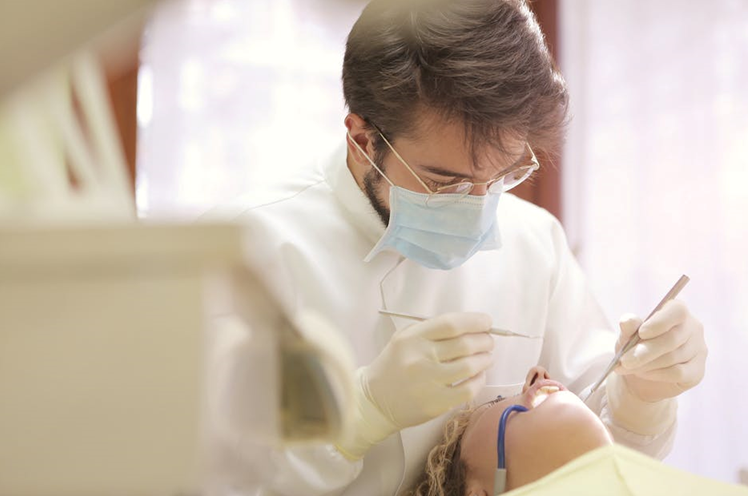Dentist or Prosthodontist for Dental Trauma?

Most dental issues are preventable through proper dental hygiene and regular checkups. But that isn’t the case for dental trauma. Dental trauma is prevalent across all ages and accounts for 5% of all bodily injuries. Children are more prone as pediatric dental trauma comprises up to 17% of their injuries.
Dental trauma is a life-changing condition, but there are solutions. Read more to learn when to visit a dentist and when to schedule a visit to a prosthodontist.
What Is Dental Trauma?
Dental trauma is a physical injury to the mouth, teeth or gums. The injuries can harm the lips or the tongue. It may cause the teeth to pull off or intrude into gums. Examples of dental trauma injuries can include:
- A missing tooth (that came out in a stressful way)
- Jaw fracture
- Lacerated lips or gums
- Chipped tooth
- Subluxation or loose tooth
- Intrusion of the teeth into the gums
- Injury to the tooth socket wall
Dental trauma can happen to anyone because of the unpredictability of accidents. You can get injured in a fight or physical abuse. You could also injure your teeth or mouth in a vehicle collision, sporting activity or a fall. Kids can incur serious injuries from slips, sprains or falls that may harm their teeth, mouth or gums.
What to Do Before Visiting a Dentist or Prosthodontist
The pain from dental trauma can be devastating. If you or someone else experienced the condition, you would want to know what to do. Waiting until you visit a prosthodontist can make the pain unbearable. The treatment may also not produce the impact it would if you had provided immediate care.
Here are some important tips to take before seeking dental attention for oral trauma:
Preserve teeth
If teeth have pulled out, preserve them to allow the prosthodontist to do dental implants. Clean the tooth and preserve it in milk or the patient’s saliva. Make sure you seek oral care immediately to have the teeth replanted.
Clean area
Rinse the mouth with warm saline water if the tooth cracked, chipped or cracked. Preserve any chipped off piece because the prosthodontist may need it for bonding. Also, rinse your mouth with warm saline water and place an icepack on a bit lip, or tongue.
Use cold
Have a cold ice press on damaged or swollen jaws for 15 minutes. The cold press may ease the pain and help prevent your jaws from further swelling. Also, make sure you get oral care right-away. Some jaw injuries require a full mouth reconstruction, which can be more successful if you don’t delay visiting a dental professional.
Get professional care
If you’re having a toothache or any pain, take some over-the-counter medications. Get a warm press as you for an oral checkup. Immediate oral care is critical if you will have successful dental care. For example, visiting a dentist in time may help resolve a knocked-out tooth. You don’t want to lose the tooth entirely.
Do You See a Dentist or Prosthodontist for Dental Trauma?
Usually, you’re more likely to call your dentist when you have any dental problem. However, not every dentist can tackle dental trauma successfully. Only 21% of 200000 dental professionals in the US are specialists.
A general dentist may conduct checks and dental care. But if they spot a significant dental issue, they are likely to refer you to a specialist. One of those specialists is a prosthodontist.
A prosthodontist performs more specific and advanced roles in dental care, unlike a general dentist. You may see them if you have a knocked tooth or when your mouth needs repair or surgery. They may also do dental implants, crowns, or dentures. Their role is to restore oral and maxillofacial features and functioning. Read here to discover more about prosthodontics.
Specialist Roles of a Prosthodontist
Prosthodontists undergo the rigorous training and education of a general dentist. But differing from a general dentist, a prosthodontist takes 3-5 more years of specialized training. They may specialize in cosmetic surgery, crown and bridge repair, implantology or temporomandibular disorders.
What Does a Prosthodontist Treat?
Dentists do dental trauma diagnosis but they may not effectively handle dental restorations. Prosthodontists are more versatile and capable of solving a range of missing tooth and facial issues. Apart from oral care, they may also help with sleep apnea, sleep disorders, and cleft issues.
Here’s an in-depth look into the dental issues that can take you to a prosthodontist.
Oral Cancer Reconstruction
Prosthodontists restore the tissues or the bones removed during oral cancer surgery. They liaise with the cancer surgeon to ensure the restoration process starts after surgery.
Restoration helps rebuild the mouth structures after surgery to achieve normal functioning. The process may enhance chewing and swallowing that were difficult before the surgery.
Full Mouth Reconstructions
Are you missing teeth due to an accident? Maybe your fillings, implants or false teeth not being helpful to your cavity problems? A full mouth reconstruction may restore your teeth or cavity functionality.
A full mouth reconstruction involves rebuilding any missing part in your oral cavity. It can improve your bite and muscles and put new teeth for a stronger oral cavity and natural smile.
Tooth Repair or Reconstruction
You need a full mouth reconstruction when you want to remove all the faults and have a stronger face. But what if you only had a chipped, cracked, or broken, or decayed tooth? This is where tooth repair or reconstruction comes into play.
Teeth repair involves procedures that depend on the problem you’re experiencing. A prosthodontist may use fillings to get rid of minor cavities resulting from decay. They also use inlays and on lays to rebuild larger parts of a damaged tooth.
TMJ syndrome
Experiencing neck or jaw muscles? A dental trauma diagnosis may show you’re suffering from TMJ syndrome. TMJ or temporomandibular disorder is a feeling of sharp pain when moving the jaws or the jaw muscles. Its signs and symptoms include:
- Painful or difficult chewing
- Difficulty in moving the mouth during eating
- Ear pains
- Facial pains
- Aching temporomandibular joints
- Tender or painful jaws
Get Rid of Dental Trauma
If you’re experiencing any dental trauma, consider a prosthodontist. That way, you can be sure you’re getting the right attention in time. A prosthodontist has the skills and tools to restore and ensure your oral cavity functions well.
For more information on health and wellness, check out other articles on our blog.





